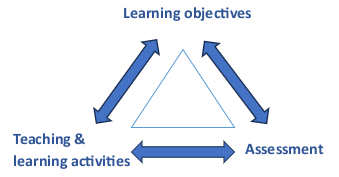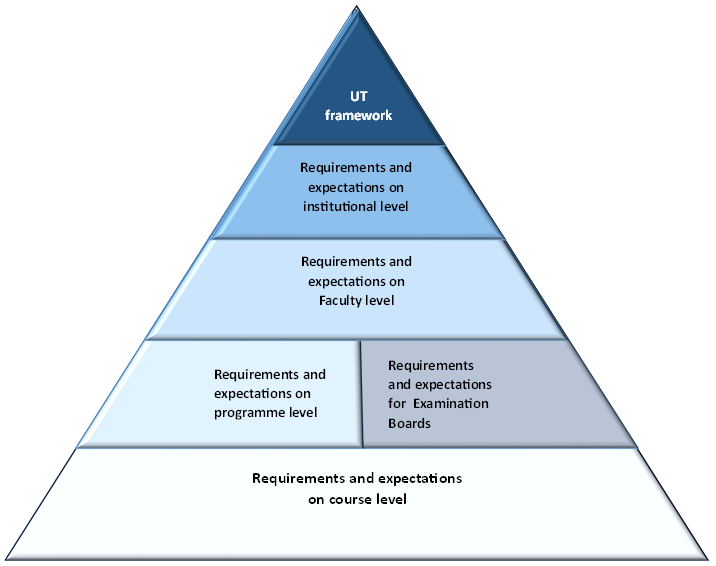Quicklink to this page: utwente.nl/assessment-policy. | This information is intended for the UT staff.
Education at UT effectively prepares students for an academic career or the labour market. In 2023, UT established its Vision on Learning and Teaching, placing three goals at the heart of our education: learning by doing, building inclusive communities and self-development. Through regular testing and assessment across all programmes, UT stimulates the learning and development of every student, monitors their study progress and assesses the student's knowledge, insights and skills. With regard to assessment and assessment policy at UT, several bodies and colleagues play key roles. With this website, the Executive Board presents the UT Framework for Assessment Policy, which:
- incorporates the core principles and objectives outlined in the UT Vision on Assessment
- provides information on requirements and recommendations
- provides a structured approach for monitoring and evaluation (PDCA)
- is aligned with applicable regulations, laws, and developments in higher education
How to use this website
This website is the UT Framework for Assessment Policy. Each level of this Framework corresponds to a specific body in the UT: Executive Board, Faculty Board, Programme Director, Examiner and Examination Board. For each level, a list of requirements is indicated, representing the minimum standards that should be in place. These requirements are explained in more detail, including reference to, for example, specific articles of the WHW and relevant policies. For many of the requirements, additional tools and examples are provided to support their implementation. In addition, the Vision on Assessment provides context to the purpose of assessment and ambitions in that field. To support the information on this website, key terms (below) have been defined.
- Level 1: Institution – Executive BoardThe Executive Board is in general responsible for establishing central supporting frameworks, policies, guidelines and procedures, for having a well-functioning PDCA cycles at all levels, and for the practical organisation of examinations. The Executive Board acts on these required elements in order to foster good quality of assessment, by establishing a Framework, a PDCA cycle for assessment, and by offering several facilities and provisions to provide practical and stuctural support. Frameworks & Guidelines To ensure good quality assessments, the Executive Board established the Framework for Assessment Policy, including a Vision on assessment, via this website. As the basis for the Framework for Assessment Policy, (inter)national principles such as the principles of the Higher Education and Scientific Research Act (WHW) and requirements and frameworks for accreditation by NVAO and ENQA are fundamental. Additionally, UT-wide agreements or documents apply as a basis, referring to, for example our Vision on Learning
- Level 2: Faculty – Faculty BoardThe head of the faculty is the Faculty Board, which is responsible for the general management of the faculty. It also oversees the management and organisation of the faculty in terms of education and research. The board is a collective body and therefore collectively responsible for its actions and decisions. However, it makes use of a division of duties amongst its members or a delegation of duties. Examples are the allocation of tasks based on the portfolios of Education, Research and Operations, and assigning the programme director the roles of programme management, organisation and implementation. The Vice-Dean is the portfolio holder and the first point of contact for (quality of) education in the faculty. When it comes to education within the programmes, the Faculty Board plays a limited but important role in assuring the quality of assessment. The requirements and expectations are explained below. PDCA cycle for Assessment Model Faculty Regulations Requirements for Faculty Boards 1. Establish the EER for
- Level 3: Programme – Programme DirectorWhen it comes to ensuring the quality of assessment, programmes play a central role. This means that an important role is reserved for the programme director, as the programme director is responsible for the content, structure, organization quality assurance, and evaluation of a programme or a combination of programmes. Assessment can effectively support the students’ learning. Assessment methods and practices may vary by programme, tailored to the specific field or discipline. They are ought to align with the university's educational goals, values and vision. There should be no doubt about the value of the diploma. That is why study programmes have the task of ensuring the quality of assessment. The examination boards safeguard the assessment quality. Based on the specific context of the programme, vision, ambitions, and principles, what needs to be done to ensure the quality of assessment needs to be established in an Assessment Policy at programme level. It shows what measures and provisions are deployed to
- Level 4: Course – ExaminerAs an examiner, you are responsible for assuring that all assessments are of a high quality. This means that the assessment should offer the students the opportunity to show their competence and that the assessment will make a good distinction between students who do and who do not master the Intended Learning Outcomes (ILOs) of the course. A good way to ensure high-quality assessment is to use the guiding principle of constructive alignment and follow the steps of the test life cycles. Below you can find what is expected of you as an examiner when designing a test and when assessing and grading a student's work. Providing (peer) feedback contributes to the learning experience of students. Learning by doing and incorporating feedback in education and assessment stimulates an active learning commitment and the self-development of students. PDCA cycle for Assessment Download the Test life cycle links to test life cycle.png Requirements for examiners 1. Ensure assessment aligns with and meets quality standards The
- Level 5: Examination BoardThe Examination Board has a special role in the process of the quality of assessment. According to the WHW, the Examination Board ‘objectively and professionally assesses whether a student meets the conditions laid down in the EER concerning the knowledge, insight, and skills required to obtain a certain degree’. If so, the Examination Board issues the diploma to the student. In addition, the Examination Board has the responsibility to ‘safeguard the quality of all assessments’. PDCA cycle for Assessment Requirements for examination boards 1. Safeguard the quality of assessment Safeguarding the quality of assessment means that as an Examination Board you have the responsibility to ensure that the assessments are of high quality (valid, reliable, and transparent) and that at the programme level, all assessments together cover all the Programme Intended Learning Outcomes which will guarantee that students who graduate deserve their diploma. Other bodies are responsible for assuring the quality of assessment: the




